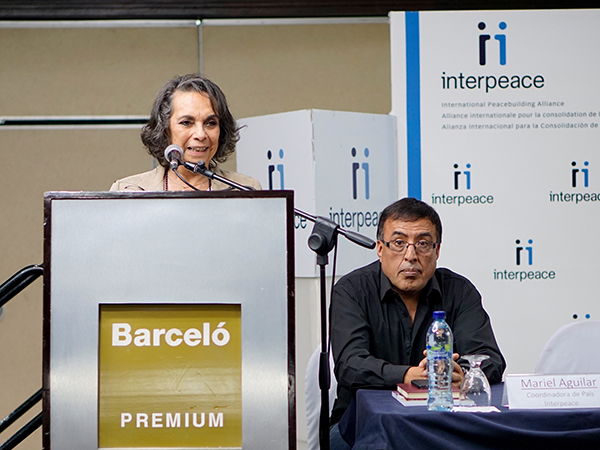Resilience and peacebuilding: Analytical frameworks for assessing resilience in Guatemala

A multi-sectoral discussion was organized by the Frameworks for Assessing Resilience in Guatemala programme. Given the context of Guatemala, the participation of multiple sectors of society and industry is unique. The programme lasted 22 months and ended with a public presentation of the book “Resilience and peacebuilding.”
The book concerns Guatemalan’s perspective on the ways in which people face up to conflict situations in their society. The findings are based on a consultation involving around 150 key actors of society in 11 departments of the country (Guatemala, Quiché, Totonicapán, San Marcos, Huehuetenango, Jalapa, Zacapa, Izabal, Alta Verapaz, Petén and Escuintla). The consultation included women, indigenous people, youth, politicians and representatives of social organizations. In this context, Interpeace implemented the Frameworks for Assessing Resilience in Guatemala programme in order to identify and promote resilience capabilities existing in Guatemalan society to transform conflict in a non-violent way.
Additionally, a survey, with the support of the Humanitarian Initiative of Harvard University, was conducted in 22 departments with around 4,000 people were interviewed. The results served as the basis for a multi-sectoral dialogue involving various sectors of society. Politicians, representatives of civil society, businessmen and experts all participated. These groups were key to defining the situations to which society is resilience. These groups were primarily resilient to insecurity and violence, socio-environmental conflicts and the issue of political corruption.
Representatives of various sectors of society with political and social influence in Guatemala attended the public release of the book. Each took a moment to express the view of their sector, as well as their experience of the dialogue process.
Norman Martínez, sub-secretary for conflict resolution of Land Affairs Secretary, highlighted that the state sector has already held talks with the private sector. He said each party expressed a willingness to work together and suggested there is awareness of the need to change the habit of each sector working in isolation. Martínez pointed out the need to join efforts to reach agreements that transcend and transform conflicts of the Guatemalan population.
Meanwhile Eduardo Aguirre, manager of inter-institutional relations at Cementos Progreso, lauded the scientific and investigative value of the research. One of the greatest achievements of this process, he said, was its success in involving multiple sectors of society.
Aguirre also expressed that the private sector needs to change and learn to apologize when necessary, but it also needs to redesign its policy on investment by returning to the practice of seeking permission before launching projects.
While Helmer Velásquez, Director of the Executive Coordination of NGOs and Cooperatives of Guatemala (CONGCOOP), stressed that it is necessary to break the narrow view that major conflicts will result in less investment.
Rokael Cardona, the Commissioner of Dialogue and Decentralization, attended on behalf of the Vice-President of the Republic, Jafeth Cabrera. He said that the government is currently creating different spaces for dialogue. However, he also stressed that patience is needed as it is important to know how to listen to stakeholders.
Resilience capabilities within society
Ana Glenda Tager, Regional Director for Interpeace Latin America, explained that the process was implemented in three countries simultaneously: East Timor, Liberia and Guatemala. The project was generously supported by the Swedish International cooperation agency.
Mariel Aguilar, Country Coordinator of the Interpeace Guatemala programme and Director of the resilience process, explained the different phases of the programme; scan, query, participatory action research, surveys and quantitative analysis and advocacy dialogue with stakeholders representing sectors of Guatemalan society.
In combination, these phases explore the resilience mechanisms that allow individuals, groups, communities and the general public to confront situations that are harmful to their quality of life, or situations that arise as a result of conflict.
This process is important in encouraging participants to reflect, analyze and debate the possibilities posed by the perspective of resilience in the transformation of conflicts by non-violent means. Interpeace provides spaces for dialogue between the participants to facilitate this.
Otto Argueta, Learning and Policy Officer at Interpeace, presented the most important findings of the Interpeace and Harvard University poll. The survey demonstrated the characteristics of Guatemalan society and its resilience while encapsulating the regional differences and variations in age, gender, ethnicity and income.
Argueta stressed that, in the case of Guatemala, trust between public institutions and the community depends on the proximity of the state with people. In addition, social participation varies in relationship of formality or informality depending on the forms of participation.
"I believe that the contribution that this group has made, through excellent methodology, mediation and team work, has generated an excellent result represented in part by this book,” Argueta said. “What I hope for rests not only on an analysis of theoretical national reality and problems which we live, but on a proposal that is echoed in the public and private institutions".
The closing remarks were made by Ivanova Ancheta, the former Vice Minister of energy and mines and an independent consultant, and Undersecretary of international cooperation in Segeplan Víctor Ayala.
Ancheta emphasized that the study of this book provides a perspective on Guatemalan’s resilience, their actions, aspirations and priorities.
Víctor Ayala recalled that Guatemalan culture has violence as part of its historical heritage and "must deconstruct the image that we have of the other, thinking that he is our enemy because he doesn't think like us." All of us have a right to dissent and to think differently, but this does not imply that we are enemies, he concluded.
